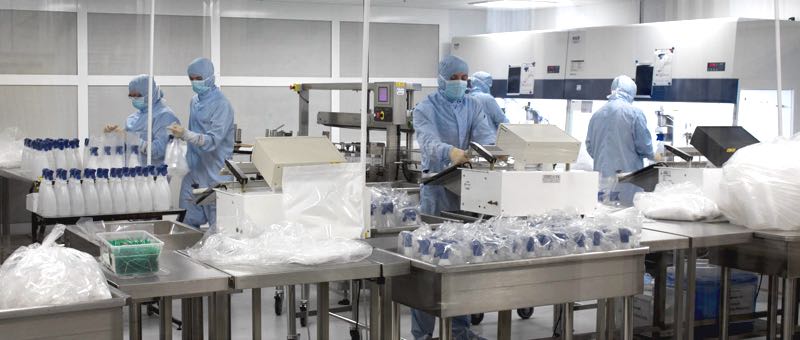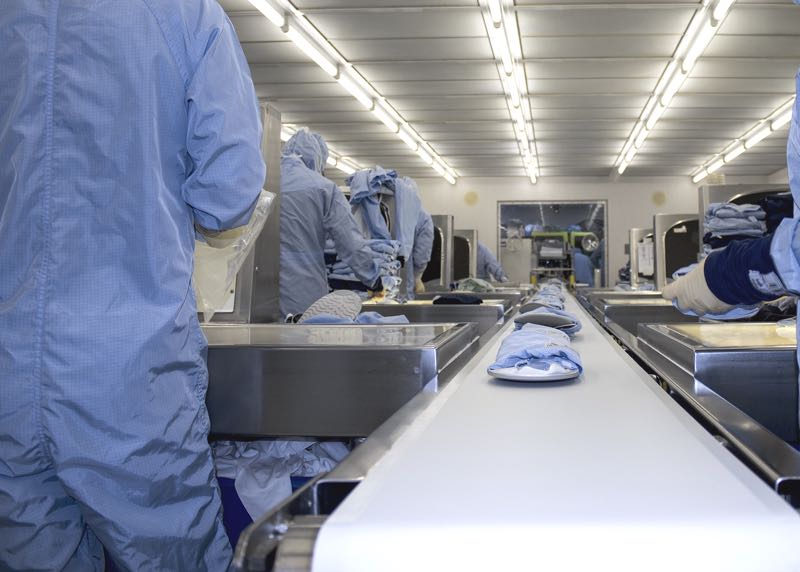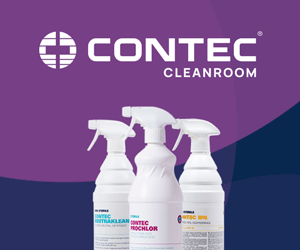Micronclean’s Simon Fry has been deeply involved in the growth of the company. He took the reins from his father to become managing director in 1993, but his relationship with the family business dates to his young age. “I would spend school holidays earning a bit of money in the laundry hanging wet garments for drying in the steam tunnel finishers or by feeding sheets into the ironers,” he recalls.
A background in physics and an electrical science degree put him in more technical projects, including work on statistical analysis of particle counts on garments to work out the variance for an estimate of the population to spearhead cleanroom build projects. In 2003, for example, Micronclean celebrated the opening of the cleanroom laundry in Louth (UK), and it was Fry who saw the opportunity to marry low costs of highly automated production with the contamination control of a large ISO Class 6 handling area.
The project incorporated the use of software and radio-frequency identification (RFID) to personalise the automation. He had introduced RFID into the Grantham laundry – Micronclean's first facility – in the mid-90s and pulled together a team of engineers to write Protrack, the proprietary software for tracking and traceability of garments and for controlling the factory automation.
At the time, the market for a Class 6 cleanroom laundry service did not really exist; customers either opted for a low- cost service from a standard laundry provider that did not achieve the required level of contamination control or a high-cost service from a Class 4 laundry that was over specified. “I believed there was an opportunity for something in the middle, and Louth remains unique in Europe and, as far as I know, in the rest of the world," Fry enthuses.
His entrepreneurial spirit hasn't stopped. Fry is overseeing a project that promises to become Micronclean's flagship international operation. The company is investing £5m in building an ISO Class 5 cleanroom laundry in India and for the past year, Fry has spent one week a month to help the local team with the design and construction. This month, the company celebrated the ground-breaking ceremony at the site in Bangalore.
Business model
A specialist cleanroom supplier, Micronclean provides workwear and cleanroom laundry services to companies in pharma, healthcare, microelectronics, aerospace and semiconductor industries Headquartered in Skegness, the company operates laundries (ISO Class 4 and 6) on three sites, two manufacturing cleanrooms (ISO Class 6) and a fleet of vehicles and distribution hubs across the UK.
The company prides itself on cost-effectively delivering cleanroom consumables from the Skegness warehouse, with over £2m of stock, alongside the regular garment service.

“We are currently a £32m turnover business, and our aspiration is to reach £100m by 2027,” Fry tells me. Growth, he says, is coming from all sectors but the largest forecast will be in export consumables and the soon-to-launch Micronclean India business.
Q. What do you think is unique about Micronclean?
A. Today, the laundry industry is hugely consolidated with the largest market player in the UK having a European turnover of €2.2bn. It has been the company's philosophy since the 1980s to specialise and to be the market's technological leader. This remains our core philosophy today.
I do not chase price down in unprofitable markets but instead invest in people, technology and infrastructure that differentiates our market offering. We try to embrace change letting old products and services go as they get to the end of their product lifecycle and developing new ones to take us into the future.
Q. What is the manufacturing and distribution strategy?
A. In laundry services, it is essential to have a reliable collection and delivery service to customers. Micronclean trunks nightly from its three Lincolnshire-based laundries to hubs at Swindon, Letchworth, Manchester, Newcastle and Perth, and distributes to customers on vehicles based locally at each of these hubs.
The distribution of our consumables outside the UK is handled by a network of distributors who hold local stock and who are able to tailor their service to the demands of culturally different countries. The technical cleanroom requirements, of course, remain the same.
Q. What are the main challenges for the business?
A. Most markets are generally well served by many suppliers. I don't see much point in entering a new market if we provide the same products and services as our competitors. Indeed, as incumbents, they will be better placed than us to obtain new business. I look for markets where we can bring genuinely differentiated products or services. This can come from several sources. It can be by developing new technology, or sometimes it can be by leveraging our existing capabilities into new markets. The challenge is to identify the markets where we can build this differentiation and have the nerve to make a long-term financial commitment to develop the product and service. A good example of this is the build of our new laundry in Bangalore.
Q. Why bringing the business to India?
A. Over the past ten years or so, we have looked at the feasibility of building an offshore cleanroom laundry. Markets were already served by cleanroom laundries (China) or were too small; many of the Eastern European markets, which were also served from afar by the nearest Western European laundry facility.
It was our consumables export business that took us to India and on meeting pharmaceutical customers we frequently got the question ‘when are you going to set up a cleanroom laundry?’. This got us looking in more depth at the market. We found that despite India's large pharmaceutical industry, there were no commercial cleanroom laundries; it was all served by in-house, on-premise laundries that were far from adequate for the job.
Q. What has gone into this project?
A. The project has been long in the gestation. A team has been visiting India for nearly three years. This has however given us a better understanding of the significant challenges! In December last year, Andrew Cole relocated his family to Bangalore to become Managing Director of Micronclean India Private Limited.
We have been working with Gleeds, a UK project management company with a large presence across India. We have acquired a three-acre site at Vemagal to the North East of Bangalore. The design is now almost concluded and we are in the process of tendering the construction packages. The build is due to be operational in Q3 2019. Phase one will be for two cleanrooms with a total capacity of 80,000 garments per week. Phase II will double this capacity.
Q. What are the features of the facility?
A. The laundry will be an ISO 14644 Class 5, GMP Grade B facility. For the first time, we will be using in-house autoclaves to sterilise the garments (we use gamma radiation in the UK). To incorporate the autoclave cycle into Protrack we are rewriting the software to provide a higher level of batch recording. This will ensure that we capture the batch parametric release data from the different stages of the process against individual garment scans to provide with the data they need to demonstrate regulatory compliance.
Q. What aspect of this project has been the most challenging?
A. We have been required to build a zero- liquid discharge (ZLD) laundry and this is a huge challenge. We will be building a five-stage RO system to purify the laundry effluent followed by a high-temperature (600oC) polishing RO unit to produce high- purity water under microbiological control. These developments, alongside others, push the technological boundary of our business, and many of them will be implemented back in the UK (after consultation with customers) when we build our new Class 4 laundry at Skegness in the near future.
Room for growth
Micronclean targets various industries and yet manages to thrive in both the domestic and overseas markets. In the UK, the focus is to grow market share based on a cost- competitive, high quality, technically excellent offering. Fry explains: “The huge consolidation that has occurred in both the laundry and consumables supply base gives Micronclean great opportunities to outperform our larger competitors and to take market share from them."

The situation is largely similar in Europe, but Micronclean’s much lower market share for consumables in the region gives the newly created export division great opportunities. “It is likely that our highest growth will be experienced in other parts of the world,” Fry points out. “The opportunity for both our laundry and consumables offering in India is huge, and we see similar consumables export growth in a number of other non-European geographies.”
Q. How do you see the market for cleanroom services moving forward?
A. I think that we will probably see the continuing consolidation across Europe of cleanroom laundry and consumable suppliers. On the customer side, the European life sciences industry is buoyant and I am hopeful that the current R&D will lead to significant increases in future production. But, most of the growth in cleanroom use will be outside of Europe. The current growth in India is phenomenal and looks like it will continue well into the future.
Q. What changes do you see in the market?
A. Over the past few years, there has been a move towards facilities management (FM) where the organisation of laundry and consumables is subcontracted. This has brought cost benefits to the pharmaceutical customer but has also placed barriers between the customer and ultimate supplier, making it more difficult to maintain the quality of supply.
The FM process can only bring the customer so much benefit and it will be interesting to see whether this trend continues or indeed if it reverses
over time.
Technology and innovation
Fry believes innovation is essential for the business. “Micronclean has strategically chosen to carry a relatively high overhead to allow it to innovate and to provide technically differentiated products and services and the company is committed to continuing this business model,” he explains. Micronclean’s R&D team is made of five professionals, plus IT and engineering teams whose expertise is often needed in product and service innovation.
Micronclean operates a microbiological lab for routine sampling for GMP purposes, and this provides an essential resource for development. “Continuous improvement is also being implemented throughout the business to enhance the efficiency of many areas of operation,” Fry notes.
Q. Can you tell what ideas are on the drawing board?
A. For many years, Micronclean has offered a range of sterile syringe packs to its manufacturing pharmacy customers. This was originally subcontract manufactured by our long-time partner Baxter Healthcare, but when they wanted to reutilise the production space, Micronclean decided to build its own cleanroom manufacturing facility. This was successfully opened at the beginning of the year and now provides Micronclean with the opportunity to develop a significantly wider range of products, many of which are currently on the drawing board.
Also imminent is the release of an aqueous disinfectant that has been in development and testing for the last year; we believe it will be market-beating.
Looking ahead
In the longer term, Fry wants to develop a fundamentally different laundry offering for PPE garments, such as fire retardant and high visibility garments. He explains: "I am keen to develop a specialist laundry service that focusses on maintaining the protective properties of the garments and then revalidates or at least reconfirms a basic adherence, against the PPE standards. This won't be easy, but will be a great project for the team to work on!"
Fry’s passion for the business is instilled in SKIEs, the company's culture embracing stewardship, knowledge, innovation and excellence. "My hope is that SKIEs will provide enough clarity and direction for the business to transition from being family-owned and run to a professionally managed business where everyone has a clarity of purpose and a clear business strategy for success.





